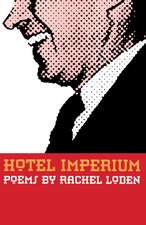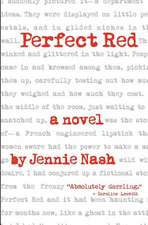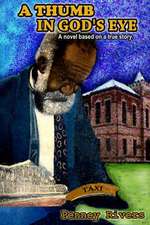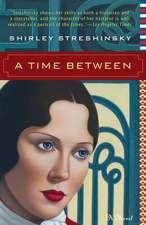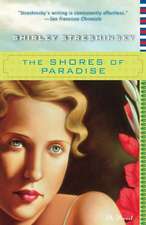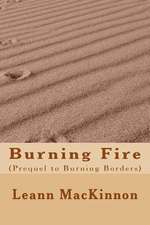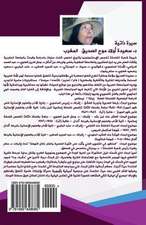Hers the Kingdom
Autor Shirley Streshinskyen Limba Engleză Paperback – 5 aug 2013
When beautiful young Willa Reade first saw the wild California coast called the Malibu, she knew she had come home. It was here, with her handsome aristocratic husband, Owen, and her crippled sister Lena, that Willa would build her empire, an empire that would grow to shelter the generations of a mighty California dynasty.
Through the boom days of the railroads, from the dance halls of San Francisco, to the revolutionary fires of China, through the bitter losses of war and the terrible secrets of a forbidden love, Willa would fight. For pride, for passion, for her children and her men . . . for the vast cherished acres of the Malibu, her kingdom, her home, her destiny.
Through the boom days of the railroads, from the dance halls of San Francisco, to the revolutionary fires of China, through the bitter losses of war and the terrible secrets of a forbidden love, Willa would fight. For pride, for passion, for her children and her men . . . for the vast cherished acres of the Malibu, her kingdom, her home, her destiny.
| Toate formatele și edițiile | Preț | Express |
|---|---|---|
| Paperback (1) | 144.34 lei 3-5 săpt. | |
| Turner (TN) – 5 aug 2013 | 144.34 lei 3-5 săpt. | |
| Hardback (1) | 298.43 lei 3-5 săpt. | |
| Turner – 5 aug 2013 | 298.43 lei 3-5 săpt. |
Preț: 144.34 lei
Nou
Puncte Express: 217
Preț estimativ în valută:
27.62€ • 28.73$ • 22.80£
27.62€ • 28.73$ • 22.80£
Carte disponibilă
Livrare economică 25 martie-08 aprilie
Preluare comenzi: 021 569.72.76
Specificații
ISBN-13: 9781618580214
ISBN-10: 1618580213
Pagini: 708
Dimensiuni: 140 x 216 x 39 mm
Greutate: 0.89 kg
Editura: Turner (TN)
ISBN-10: 1618580213
Pagini: 708
Dimensiuni: 140 x 216 x 39 mm
Greutate: 0.89 kg
Editura: Turner (TN)
Cuprins
Book I
From the Prairie To the Ocean, 1887-1892
Book II
Rancho Malibu y Sequit: The Early Years, 1893-1895
Book III
In the Shadow of the Hawk, 1896-1903
Book IV
The Malibu: Women and Children, 1908-1912
Book V
Porter and Kit, 1913-1922
Book VI
Sea Changes, 1922-1939
From the Prairie To the Ocean, 1887-1892
Book II
Rancho Malibu y Sequit: The Early Years, 1893-1895
Book III
In the Shadow of the Hawk, 1896-1903
Book IV
The Malibu: Women and Children, 1908-1912
Book V
Porter and Kit, 1913-1922
Book VI
Sea Changes, 1922-1939
Recenzii
“Streshinsky’s writing is consistently effortless . . . reminiscent of the very best of Willa Cather. A remarkable story, an evocative novel.” —San Francisco Chronicle
“Broad in scope and rich in detail, this is an intelligent and enjoyable book.” —Publishers Weekly
“‘A superior saga’ . . . What has been wrought here is a strong and absorbing story full of people who thunder along in interesting ways, surrounded by the trappings of wealth, grabbing for power or struggling against it, savoring passion, covering their tracks. A great California novel.” —Los Angeles Times
“This gracefully written saga combines early California history with an absorbing tale of two sisters—each strong and flawed in her own way . . . an episodic narrative covering six decades which encompasses a devastating fire, the Great Depression, World War I and the urbanization of the West—a satisfying and imaginative novel.” —Los Angeles Herald Examiner
“An absorbing, large-scale story of strong women and the land that gives them sustenance . . . Grabs the imagination. Highly recommended.” —Library Journal
“The epic saga you’ve been looking for.” —Glamour
“[Streshinsky’s novels] are the best historical fiction being written in America.” —John Jay Osborn, Jr., bestselling author of Paper Chase
“A cast of indomitable characters and a portrait of a state coming of age are the attractions in this sprawling saga that stretches from the rolling plains of the Midwest to the untamed shores of California.” —Chattanooga Times
“Broad in scope and rich in detail, this is an intelligent and enjoyable book.” —Publishers Weekly
“‘A superior saga’ . . . What has been wrought here is a strong and absorbing story full of people who thunder along in interesting ways, surrounded by the trappings of wealth, grabbing for power or struggling against it, savoring passion, covering their tracks. A great California novel.” —Los Angeles Times
“This gracefully written saga combines early California history with an absorbing tale of two sisters—each strong and flawed in her own way . . . an episodic narrative covering six decades which encompasses a devastating fire, the Great Depression, World War I and the urbanization of the West—a satisfying and imaginative novel.” —Los Angeles Herald Examiner
“An absorbing, large-scale story of strong women and the land that gives them sustenance . . . Grabs the imagination. Highly recommended.” —Library Journal
“The epic saga you’ve been looking for.” —Glamour
“[Streshinsky’s novels] are the best historical fiction being written in America.” —John Jay Osborn, Jr., bestselling author of Paper Chase
“A cast of indomitable characters and a portrait of a state coming of age are the attractions in this sprawling saga that stretches from the rolling plains of the Midwest to the untamed shores of California.” —Chattanooga Times
Notă biografică
Shirley Streshinsky is a critically acclaimed author of three works of nonfiction and four historical novels. As a journalist and travel essayist, she has written extensively for a wide range of national magazines such as Redbook, Glamour, Preservation, American Heritage, The American Scholar, and Condé Nast Traveler. She is the recipient of the Society of Magazine Writers’ Award for Excellence and the National Council for the Advancement of Education Writing award, and was cited by The Educational Press Association of America for “superlative achievement in features.” Her travel essays have been a feature on National Public Radio. She was married to the late photojournalist Ted Streshinsky and resides in Kensington (Berkeley), California.
Extras
Los Angeles December 29, 1939
You will want to know why I am writing this. I will tell you. It is not so simple.
The light this morning was searing and flat, California light. It bleaches the edges, obliterates all but the idea so that the palm I can see from my bedroom window is only the suggestion of a palm, the sort you might see in a mirage. After fifty years in California, I cannot adjust to the light.
I was beginning to dress when the postman's bell rang. My hip was hurting more than usual this morning, slowing me down. I hobbled into the hall to see Trinidad studying the envelope. It was the letter. I felt it.
A hot liquid surge slapped against my inner ear and threatened my balance. I steadied myself against the wall. Trinidad saw and put out her hand to help me. I could feel her eyes on me but I would not look at her. In her age Trinidad has become sentimental, her eyes fill too easily, and I had not the strength to comfort her. It took all I had to reach for the letter, to take it in my hand.
I slipped the envelope into the pocket of my dress and held my hand against it. Then I made my way to the library where Willa would be waiting. I do not know how early she gets there. Very early, I think. She is always waiting when I arrive each morning at nine with the mail and the Times. It is our habit, my sister's and mine, to go through the mail together. Then I read the headlines to her, though this morning I did not take the Times with me, but left it on the hall table.
I slipped quickly from the glare of the hallway into the gloom of the library and for a few moments I could see nothing. I waited for my eyes to adjust, my hand pressed hard against the letter in my pocket. Slowly, the room came into focus . . . the high, dark oak, the deep red Persian carpets, Willa sitting behind the desk, her hands folded in her lap. She no longer pretends work; she has not for some weeks.
The heavy velvet drapes on the window behind my sister had not been fully closed, so that a shaft of light struck her diagonally in such a way as to illuminate her. I blinked. For the briefest moment I saw her as she had been, the girl. My heart began to race. I blinked again and saw my mistake even as I felt the stab of pain I knew to be disappointment.
"There is a letter from Kit," I said, short of breath.
"Yes," my sister answered, as if she had known.
I hobbled over to the chair beside the desk, as I did every morning out of habit, knowing that the habit was broken on this morning but seeking the comfort of it. I took out the letter and looked at Kit's small, square hand on the envelope, at the return address—the Cavendish, London. The letter was addressed to Willa. She nodded to me to read it. My hands were shaking, but I opened the letter.
"Dear Mother and Aunt Lena," Kit wrote, "wonderful news—Porter is going to be fine. The doctors assure me he will make a full recovery. He will not lose his leg."
The energy drained out of me, I could feel it going. I felt weak and sick with relief. All the fears of the past days and months rushed at me and I could hear myself sobbing. Willa waited. It was a long time, but she said nothing.
Finally I wiped my eyes and blew my nose and read on: "I have seen for myself," Kit wrote, "his wounds were serious but there will be no permanent damage, except for some scars which he can show to his grandchildren when he tells them stories of bravery, when he was fighting the Falanges in Spain." I could hear Kit, hear the tenderness in her low, husky voice.
I read on: "My stubborn twin brother is intent on saving this sad world, as you well know. My only intent, right now, is to save Porter . . . to bring him home again to recuperate. He has agreed to return with me as soon as he is able to travel, another fortnight, at least, his English doctors say. I wish I could bring him back to the Malibu. I wish the only road in was the beach at lower low tide, the way it was when you first went there. I wish we could close ourselves in and be safe on the Malibu. You used to say that wishing was a kind of dreaming, Auntie. If you were here in England now, you would know that this is not a world for dreaming. You would know that there are no safe places anymore."
My eyes filled again and I could not read on. I passed the letter to Willa.
"Thank God," I whispered.
"I know," Willa answered, and I knew that she did know.
"Thank God Porter is going to be whole again. Thank God Porter will not be a cripple . . ."
For a while the only sound in the library was the sound of my sniffling. Willa put on her reading glasses to finish Kit's letter. She did not read aloud.
Finally she said, in the tone of voice she might have used to discuss the dinner menu, "When they return, Kit will see to selling the Malibu."
I searched my sister's face.
She seemed to be studying the dust motes that floated in the shaft of light.
"It had to be, Willa," was all I could think to say.
"Yes," she answered, in the same flat tone.
I thought, then, what a clever girl Kit was. She would have made the decision to sell months ago, before she went to England. It was inevitable, we all knew that. But she had waited, waited until she had wonderful news—Porter would live and he would be well again. Only then could she find a way to say the words her mother had never wanted to hear—that the Malibu was lost.
I remembered then how, upon entering the library, I had been hurtled into the past, had seen Willa as a young woman, had felt the stab of disappointment even as I realized my mind was playing tricks on me. Until that moment I had not known how much I longed to hear her laugh again, to have her with me as it was, as it always has been . . . to have her back.
Then I saw the lilacs on the desk and I understood. It was the smell of lilacs that had sent me reeling into the past. In the springtime on the ranch at Malibu, when lilacs bloomed all about the house, Willa" had always kept fresh bouquets in every room so that the scent sifted throughout the house. I wondered where Trinidad had managed to find lilacs so early.
Poor, dear Trinidad, I thought. Poor sweet simple old woman, to think of lilacs.
Willa sighed, a low, shuddering sigh.
"Take them away," she said to me, "I don't want to remember anymore."
You will want to know why I am writing this. I will tell you. It is not so simple.
The light this morning was searing and flat, California light. It bleaches the edges, obliterates all but the idea so that the palm I can see from my bedroom window is only the suggestion of a palm, the sort you might see in a mirage. After fifty years in California, I cannot adjust to the light.
I was beginning to dress when the postman's bell rang. My hip was hurting more than usual this morning, slowing me down. I hobbled into the hall to see Trinidad studying the envelope. It was the letter. I felt it.
A hot liquid surge slapped against my inner ear and threatened my balance. I steadied myself against the wall. Trinidad saw and put out her hand to help me. I could feel her eyes on me but I would not look at her. In her age Trinidad has become sentimental, her eyes fill too easily, and I had not the strength to comfort her. It took all I had to reach for the letter, to take it in my hand.
I slipped the envelope into the pocket of my dress and held my hand against it. Then I made my way to the library where Willa would be waiting. I do not know how early she gets there. Very early, I think. She is always waiting when I arrive each morning at nine with the mail and the Times. It is our habit, my sister's and mine, to go through the mail together. Then I read the headlines to her, though this morning I did not take the Times with me, but left it on the hall table.
I slipped quickly from the glare of the hallway into the gloom of the library and for a few moments I could see nothing. I waited for my eyes to adjust, my hand pressed hard against the letter in my pocket. Slowly, the room came into focus . . . the high, dark oak, the deep red Persian carpets, Willa sitting behind the desk, her hands folded in her lap. She no longer pretends work; she has not for some weeks.
The heavy velvet drapes on the window behind my sister had not been fully closed, so that a shaft of light struck her diagonally in such a way as to illuminate her. I blinked. For the briefest moment I saw her as she had been, the girl. My heart began to race. I blinked again and saw my mistake even as I felt the stab of pain I knew to be disappointment.
"There is a letter from Kit," I said, short of breath.
"Yes," my sister answered, as if she had known.
I hobbled over to the chair beside the desk, as I did every morning out of habit, knowing that the habit was broken on this morning but seeking the comfort of it. I took out the letter and looked at Kit's small, square hand on the envelope, at the return address—the Cavendish, London. The letter was addressed to Willa. She nodded to me to read it. My hands were shaking, but I opened the letter.
"Dear Mother and Aunt Lena," Kit wrote, "wonderful news—Porter is going to be fine. The doctors assure me he will make a full recovery. He will not lose his leg."
The energy drained out of me, I could feel it going. I felt weak and sick with relief. All the fears of the past days and months rushed at me and I could hear myself sobbing. Willa waited. It was a long time, but she said nothing.
Finally I wiped my eyes and blew my nose and read on: "I have seen for myself," Kit wrote, "his wounds were serious but there will be no permanent damage, except for some scars which he can show to his grandchildren when he tells them stories of bravery, when he was fighting the Falanges in Spain." I could hear Kit, hear the tenderness in her low, husky voice.
I read on: "My stubborn twin brother is intent on saving this sad world, as you well know. My only intent, right now, is to save Porter . . . to bring him home again to recuperate. He has agreed to return with me as soon as he is able to travel, another fortnight, at least, his English doctors say. I wish I could bring him back to the Malibu. I wish the only road in was the beach at lower low tide, the way it was when you first went there. I wish we could close ourselves in and be safe on the Malibu. You used to say that wishing was a kind of dreaming, Auntie. If you were here in England now, you would know that this is not a world for dreaming. You would know that there are no safe places anymore."
My eyes filled again and I could not read on. I passed the letter to Willa.
"Thank God," I whispered.
"I know," Willa answered, and I knew that she did know.
"Thank God Porter is going to be whole again. Thank God Porter will not be a cripple . . ."
For a while the only sound in the library was the sound of my sniffling. Willa put on her reading glasses to finish Kit's letter. She did not read aloud.
Finally she said, in the tone of voice she might have used to discuss the dinner menu, "When they return, Kit will see to selling the Malibu."
I searched my sister's face.
She seemed to be studying the dust motes that floated in the shaft of light.
"It had to be, Willa," was all I could think to say.
"Yes," she answered, in the same flat tone.
I thought, then, what a clever girl Kit was. She would have made the decision to sell months ago, before she went to England. It was inevitable, we all knew that. But she had waited, waited until she had wonderful news—Porter would live and he would be well again. Only then could she find a way to say the words her mother had never wanted to hear—that the Malibu was lost.
I remembered then how, upon entering the library, I had been hurtled into the past, had seen Willa as a young woman, had felt the stab of disappointment even as I realized my mind was playing tricks on me. Until that moment I had not known how much I longed to hear her laugh again, to have her with me as it was, as it always has been . . . to have her back.
Then I saw the lilacs on the desk and I understood. It was the smell of lilacs that had sent me reeling into the past. In the springtime on the ranch at Malibu, when lilacs bloomed all about the house, Willa" had always kept fresh bouquets in every room so that the scent sifted throughout the house. I wondered where Trinidad had managed to find lilacs so early.
Poor, dear Trinidad, I thought. Poor sweet simple old woman, to think of lilacs.
Willa sighed, a low, shuddering sigh.
"Take them away," she said to me, "I don't want to remember anymore."
Descriere
When beautiful young Willa Reade first saw the wild California coast called the Malibu, she knew she had come home. It was here, with her handsome aristocratic husband, Owen, and her crippled sister Lena, that Willa would build her empire, an empire that would grow to shelter the generations of a mighty California dynasty.
Through the boom days of the railroads, from the dance halls of San Francisco, to the revolutionary fires of China, through the bitter losses of war and the terrible secrets of a forbidden love, Willa would fight. For pride, for passion, for her children and her men . . . for the vast cherished acres of the Malibu, her kingdom, her home, her destiny.
Through the boom days of the railroads, from the dance halls of San Francisco, to the revolutionary fires of China, through the bitter losses of war and the terrible secrets of a forbidden love, Willa would fight. For pride, for passion, for her children and her men . . . for the vast cherished acres of the Malibu, her kingdom, her home, her destiny.



